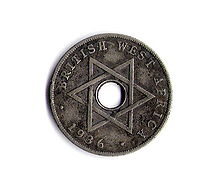British West Africa
British West Africa ( English British West Africa ) was the name for the British possessions and "protected areas" from 1821 to 1850 and 1866 to 1888 in West Africa . The capital was today's Sierra Leonean capital, Freetown .
The area initially carried the designation colony of Sierra Leone and its dependent territories (English Colony of Sierra Leone and its Dependencies ), followed by the British West Africa regions (British West African Territories) and then British West Africa Settlements (British West African Settlements)
Expansion of British West Africa
British West Africa comprised the areas of today's states of Sierra Leone, Nigeria , Gambia and Ghana (former name: Gold Coast ). The beginnings of British influence in this part of Africa go back to the 17th century, when the British established fortified trade bases here such as Cape Coast Castle or Fort Metal Cross . In various ways, they colonized the areas around these bases from the late 1780s to the 1960s .
British West Africa was never a single administrative area within the British colonial system, but there was a single currency within these areas from 1907 to 1962 (or until the individual states became independent), the West African pound .
Different forms of exercise of power
The British made a distinction within British West Africa between crown colonies , protectorates and territories . These differentiations were much more than just administrative distinctions. They related to different degrees of autonomy of the territories and to possible civil rights of the residents.
Crown colonies within British West Africa were small areas around the city of Bathurst in what is now the Gambia, around the city of Freetown in what is now Sierra Leone and around the city of Lagos in what is now Nigeria. A larger area only comprised the Gold Coast Crown Colony , which consisted of the coastal area of today's Ghana. Within these crown colonies formed in the 19th century, the influence of the British was more direct, but there was also extensive freedom of the press and certain civil rights. For example, the residents had the right to form political associations and local lawyers were able to legally prevent excesses of the colonial regime.
The rest of British West Africa, geographically the absolutely predominant part, consisted of “protectorates” and “territories” in which largely traditional structures - or what the British thought they were - were retained. Here lawyers were forbidden to practice and political associations could only be formed disguised as cultural organizations. The concept of so-called indirect rule was invented for these areas , ie the “indirect rule” of the British, which ran partly through recognized traditional rulers, but often also through “traditional rulers by the grace of Great Britain”, which was not widely accepted within the population.
The elite"
In the first half of the 20th century, there was a native class, educated to the west, called the "elite" within British West Africa. These - mostly - men usually knew each other, no matter which part of British West Africa they came from. They mostly moved freely between the individual British areas and - in contrast to the educated classes within the French colonies - had more of a West African than a Nigerian or Gambian identity.
The end of British West Africa
The end of British colonial rule in West Africa was accelerated by the Second World War , which brought about a considerable economic upswing and the first beginnings of industrialization in West Africa. In addition, this war was fought with the participation of several thousand West African soldiers in British service on the side of the Allies in the name of freedom and democracy. The pace of decolonization continued to be determined by various forms of civil resistance and open uprisings in the individual colonies, e.g. B. the so-called Accra riots in 1947 in the Gold Coast.
Ghana gained independence in 1957, Nigeria followed in 1960, Sierra Leone in 1961 and Gambia in 1965.
See also
literature
- The Growth of African Civilization. The Revolutionary Years. West Africa since 1800 , Longman 1984.
Individual evidence
- ↑ a b Sierra Leone . Retrieved February 1, 2019.



